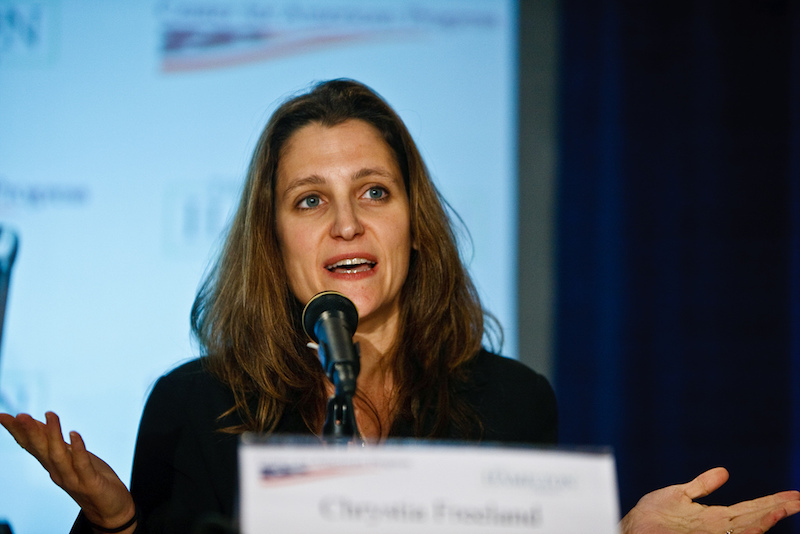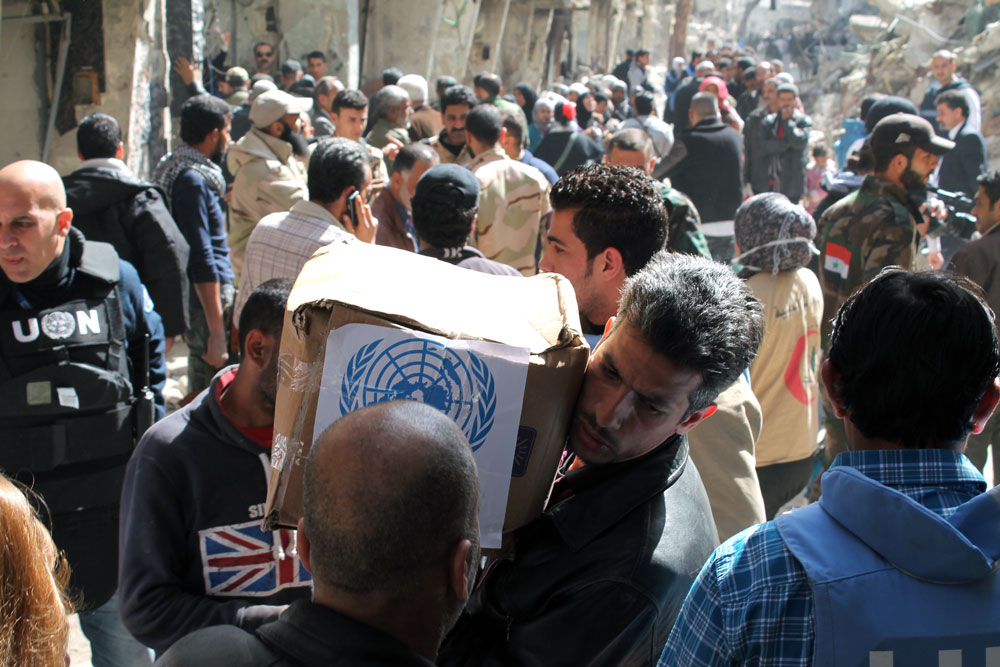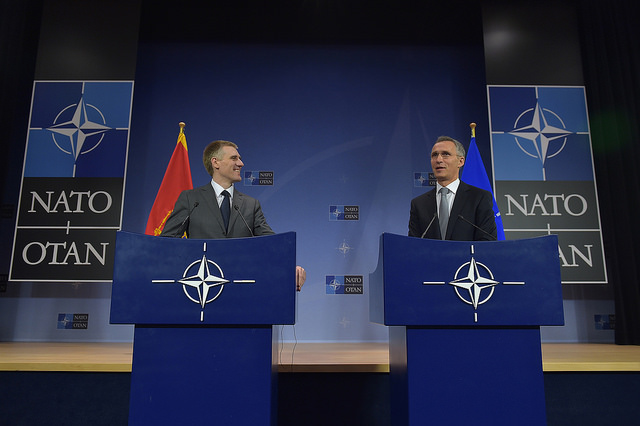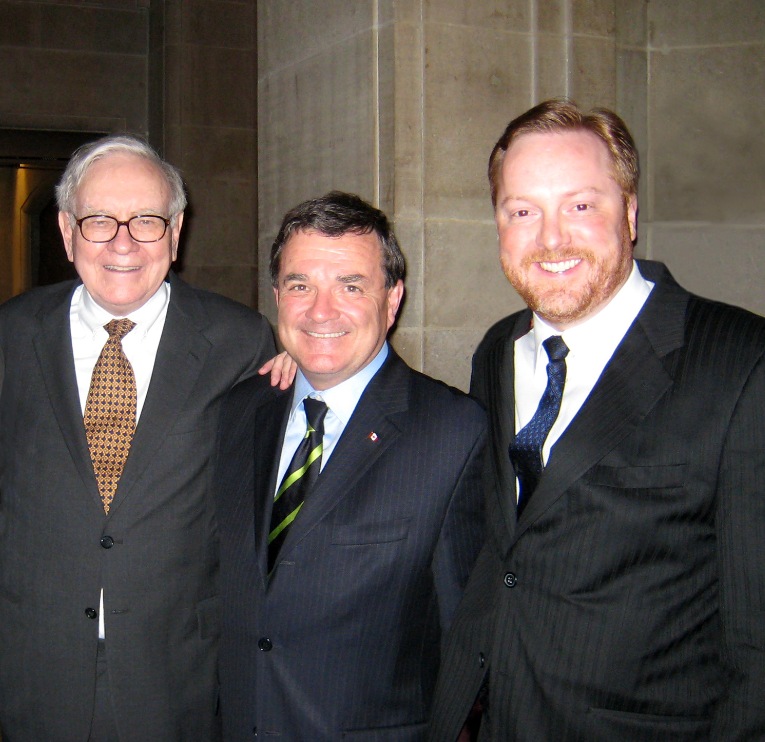Foreign Minister Chrystia Freeland gave a long awaited foreign policy speech yesterday. There have even been reports that the government is thinking about making the speech an annual event, where the foreign minister lays out Canada’s foreign policy before the public. This is particularly encouraging, for it would lead to a normalization of foreign policy discussion throughout Canada. Below are the 5 most important phrases contained in the speech.
1. Global Balance of Power
In North American parlance, any mention of a balance of power is anathema and often accompanied by the pejorative ‘outdated’. Only Realpolitik can conjure a similarly debilitating dyspepsia due to its German connotation. Freeland’s mention of a global balance of power marks a watershed in Canadian foreign policy. First, it demonstrates that the balance of power does not cease to operate simply because some nations decide to neglect it, to their detriment. Second, having acknowledged recalibrations in the global balance of power since 1945, Freeland correctly categorized nations in Asia and Latin America as being beneficiaries of this recalibration, and the general shift of power from the Atlantic to the Pacific is a development that will affect the course of the 21st century. It is important that Freeland made an effort to describe a Canada that shapes the balance of power instead of accepting a passive role where Canada is shaped by alterations in the global balance.
2. Canadian diplomacy requires the backing of hard power
Another riveting reference to what should also be an obvious fact: prudent diplomacy can strengthen, but never act as a substitute for military power. Freeland seemed intent on pressing home the point that Canada has, is, and will continue to make the necessary material contributions and sacrifices for upholding the liberal international order, which Canada greatly benefits from. Freeland rightly renounced reducing Canada to an American “client state” and made clear that the “principled use of force…must be part of our future”. Canadian diplomacy is at its most effective when operating within the framework of the liberal international order, but that order, it was pointed out, is under serious strain from state and non-state actors. A Canada committed to defending its interests, which are inextricable from the liberal international order, must be willing to sustain the necessary financial burdens accompanying this commitment. More importantly, the Canadian people need to understand why this burden is worth sacrificing for, because if a democratic public does not support the policies of its government, then those policies quickly lose legitimacy and become unsustainable, regardless of how worthy their cause is.
3. Democratic world
Freeland made little secret of Canada’s interest in identifying, associating, and acting in concert with other “open societies” and the “democratic world”. Democracy is a vital component of the liberal international order but its values are not shared by all the members participating in this order. Freeland clearly stated that Canada is not the world’s “policeman”, and therefore should not embark on a liberal interventionist spree to impose Canadian values across the world. Instead, Canada is to fulfill its role by setting the standard and not imposing it. By virtue of the magnanimity of Canada’s performance, Canada intends to serve as a beacon of inspiration for all others. What Freeland did not address is the underlying tension between democracies and non-democratic regimes, the majority of which are in the global South and Asia- areas which Freeland identified as ‘rapidly emerging’. This tension manifests most often when countries who were not involved in constructing the liberal international order (promoting the attitude that they have less of a stake in it), and who at times feel constrained by it, like China, disagree with the standards set by this order. China’s rejection of the Hague Tribunal’s judgment over China’s activity in the South China Sea is one such example. Freeland is not incorrect in making the case for China’s integration into the world’s political and economic system in a way that is “additive”, but what will Canada do if this does not succeed?
4. Trade
The third pillar of Freeland’s foreign policy speech, in addition to power and values, was trade. Trade is an important component of globalization and Freeland importantly made the distinction between domestic policies that determine the distribution of the fruits of trade and the value of international trade in itself. The shift in the global balance of power from the West to the East has not a little to do with countries in Asia and Latin America delivering a higher standard of living to entrepreneurial populations. Freeland called the opportunity to get these countries to join the multilateral system that supports this trade a “great” one, but again left significant tensions unaddressed. These tensions are not unrelated to those mentioned above, and once again China serves as the most powerful example of a scenario where Canada’s trade and security interests come into conflict with its values. Canada has stated that any trade agreement with China will involve labour standards and human rights, as Canada understands them; but, how far is Canada willing to sacrifice its interests to uphold its values, despite the two being inseparable to any Canadian?
5. Trump
Almost all media headlines following Freeland’s speech centered on what Freeland did not say in the speech: Trump’s name. While the media focused on Freeland’s rejection of Trump’s America First approach without ever naming him, there is an equally, if not more important, lesson to be learned by Freeland addressing the United States of America, not Trump. That lesson is that international relations should not be personalized. The very global balance of power spoken of earlier is largely a function of systemic factors (such as geography) and the material correlation of forces. Individual personalities have an important role to play, but international affairs are not conducted on the basis of mutual individual affability, and an amicable atmosphere between two leaders is no guarantee of a successful relationship between their two countries. A more reliable guarantor of success is a structure that incentivizes a country to pursue a particular policy regardless of who the leader in charge is. (Recall that the bloodiest of European wars were often fought by leaders who were related to each other by blood). By focusing on the policies of America, and not Trump, Freeland did every Canadian a favour by sending a subtle reminder that international relations should not be personalized, because nations are permanent, while leaders are not.
Photo: Chrystia Freeland’s speech to the Center for American Progress (2010) by Ralph Alswang via Flickr. Licensed by CC BY-ND 2.0.
Disclaimer: Any views or opinions expressed in articles are solely those of the authors and do not necessarily represent the views of the NATO Association of Canada.




